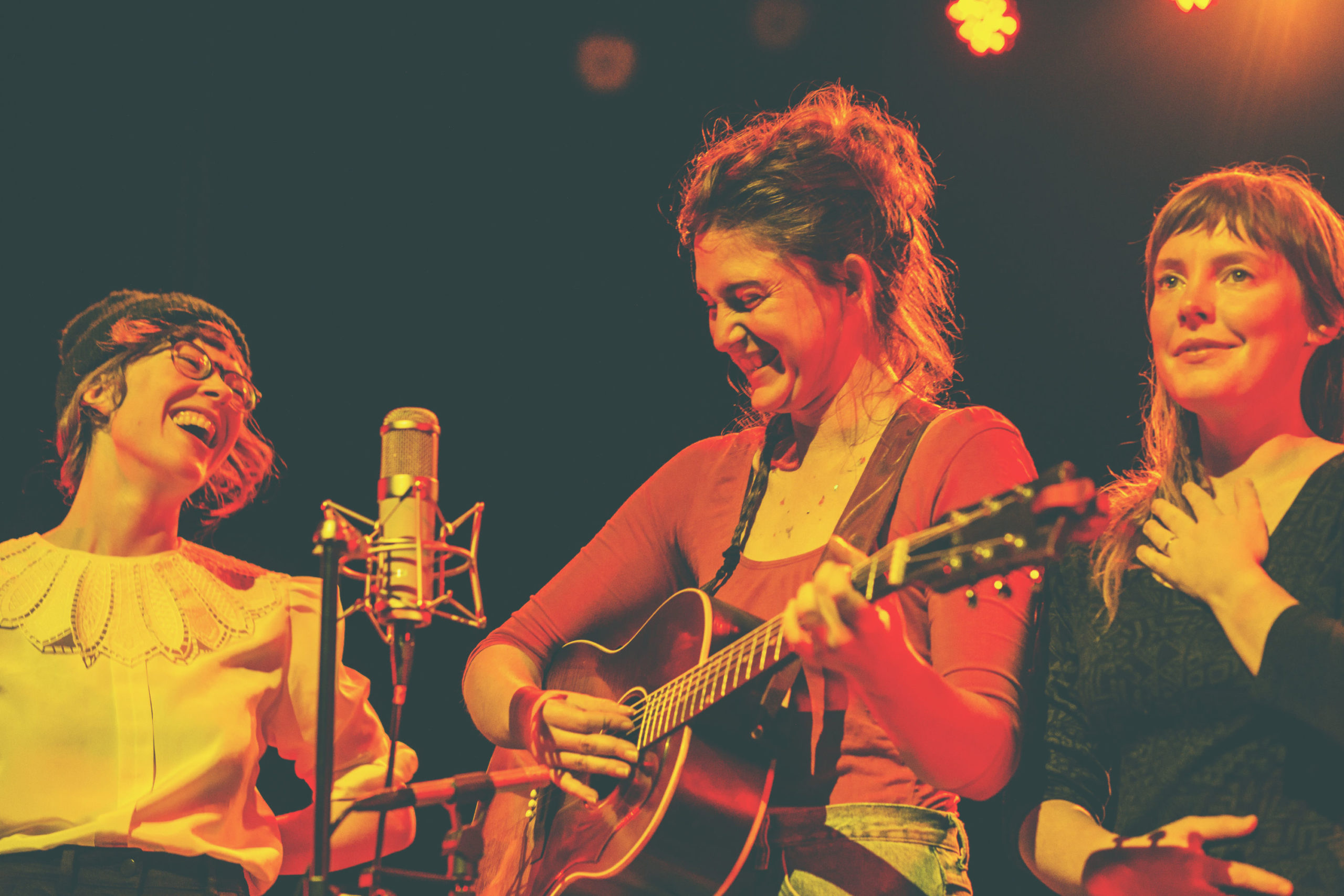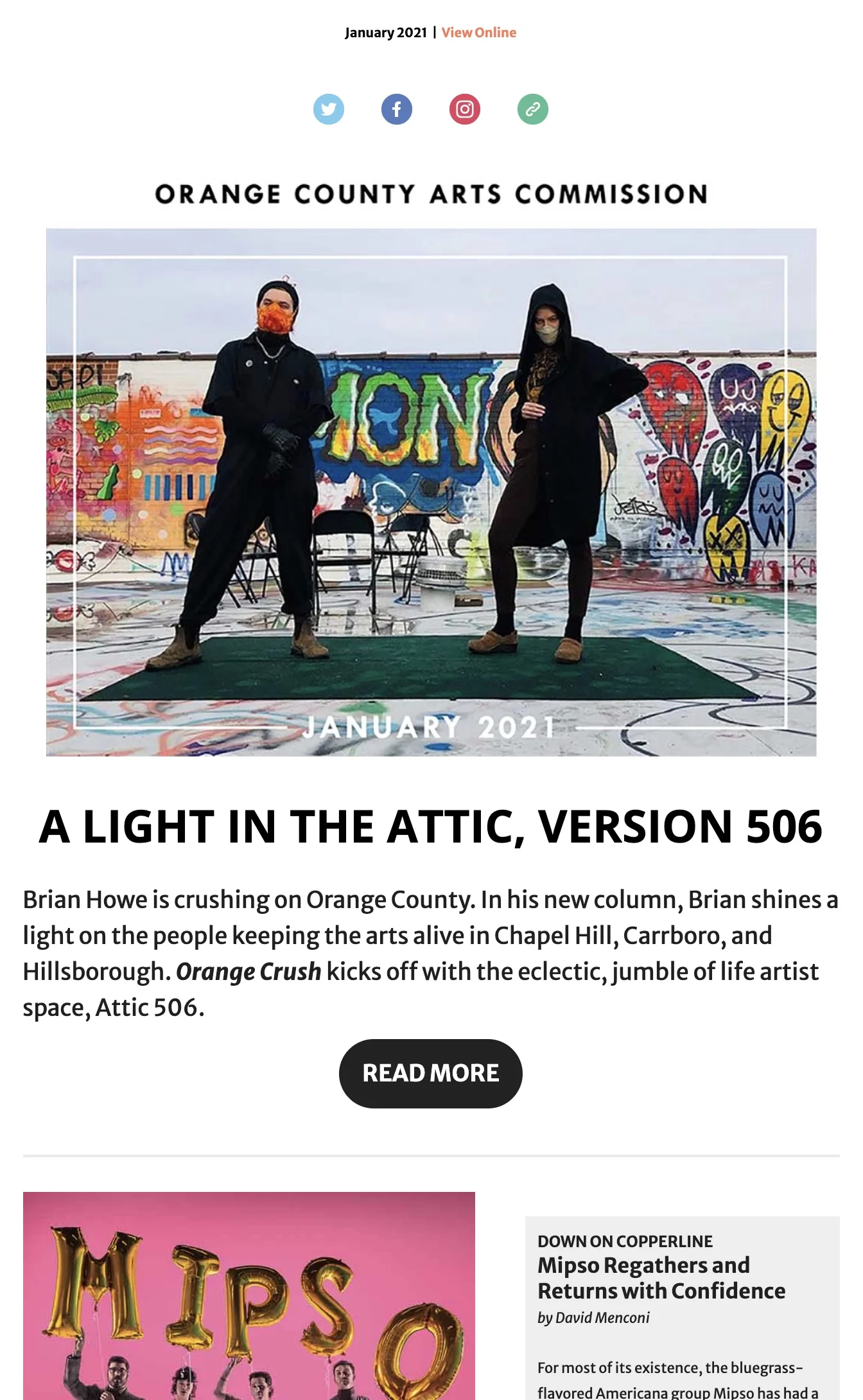
—Article by David Menconi
There’s always been an element of kismet to Mountain Man, the vocal trio of Molly Sarlé, Alexandra Sauser-Monnig and Sylvan Esso’s Amelia Meath. They first met while college students at Bennington in Vermont, when Meath overheard Sarlé singing, learned one of her songs and decided that her other friend Sauser-Monnig should team up with them.
From the start, the three women’s voices fit together perfectly, in a lovely blend on spare, often unadorned folk songs, evoking the feeling of singing around a campfire. In addition to performing as Mountain Man, they backed up acts including Feist and Decemberists. After a stretch of years when they were scattered across the country, they reconvened in the Triangle, where Meath had moved to form the Grammy-winning electronic duo Sylvan Esso with Nick Sanborn.
Sarlé and Sauser-Monnig both wound up living in Hillsborough. Since the most recent Mountain Man album, 2018’s Magic Ship, they’ve both made solo albums – Sarlé’s Karaoke Angel and Sauser-Monnig’s Dawnbreaker under the name Daughter of Swords – while also releasing a steady stream of Mountain Man cover songs by the likes of John Denver, Wilco and Fiona Apple. There will almost certainly be another Mountain Man album at some point, but you’ll be hearing more from all three of them in some combination regardless.
Here’s more from them.
DM: When you sing together as Mountain Man, it sounds effortless. Do you have to spend too much time practicing?
Molly Sarlé: We don’t usually spend too much time rehearsing, though it seems we do get into an extra special zone when we do. One of the magical things about Mountain Man is the intuitive musical connection that we have – it has often seemed to come quite naturally.
Alexandra Sauser-Monnig: Yeah, we’ll often have a breakfast date or an afternoon snack date right before a tour or a livestream or whatever the case is to sing together, and maybe play through whatever covers we might be including. But as Molly said, it comes pretty naturally.
DM: What’s your main songwriting tool – notebook paper and No. 2 pencil? Mobile-phone recording app? Photographic memory?
MS: My main tool is my brain and my body. I use voice-memo apps, but I find that usually my favorite songs – or just songs that end up feeling finished to me in general – are the ones that stay in my mind and don’t require any kind of recording. Just the feeling that they need to be expressed.
ASM: I definitely use pen and paper and voice memos to help work out the words and record ideas if they happen when I don’t have time to dig in. But mostly it’s a lot of sitting and singing and playing and revising, and then going for a walk and coming back.
DM: Do you find you’re writing all the time, or do you need specific deadlines?
MS: I go through phases of writing all the time, and honestly haven’t worked very often with songwriting deadlines, so I assume they might not be helpful – but who knows! Maybe they could be. It usually takes an unpredictable amount of time for me to say something in a song that I really want to say.
ASM: As a procrastinator, I find deadlines pretty unhelpful, and so I try to cultivate a practice of working on songs a little bit or a lot every day. The more in the habit of doing that I am in, the easier it is to get into the brain-space of writing.
DM: Molly, you do online songwriting workshops. What are some drills or prompts you use to encourage people to write?
MS: The basis of the workshops is creating community around songwriting! I think every person is innately creative, and having a supportive and encouraging setting can help reveal that truth. I do provide prompts, like using your favorite scene from a movie to write a song that includes a conversation. I love this prompt because there are so many incredible stories that already exist in the world, that we already have personal connections to draw on for inspiration and empathy. It’s also helpful to understand that most people struggle with the same things while writing or being creative – “inner critic” and such – so just having a space where people feel less alone in their experience is helpful.
Q: Alexandra, Dawnbreaker has a lovely song called “Shining Woman” that describes a bicycle rider who dispenses some wisdom and “rode away into the breeze/I watched her grow small and shimmery.” Was that something that actually happened?
ASM: Yeah, I was on a road trip several years ago driving on a coastal road in California or Oregon, and I kept passing people on bike trips all loaded down with gear in groups of two or three. Then I passed a woman biking alone. I took note in the moment because as a person not born into a man’s body, the excitement you might feel at the prospect of solo outdoor adventures is automatically tempered or at times canceled out by the fear of bodily harm done to you at the hands of someone bigger. So seeing this woman on a solo bike trip was inspiring.
DM: A possibly silly question, but what is the story behind calling a female vocal trio Mountain Man?
ASM: We were getting ready to play our first show and our friend Alex Bleeker of Real Estate was like, “Do you have a band name? What are you called?” We kind of sat there for a few minutes and I said, “What about Mountain Man?” We all agreed, it felt like the name.
